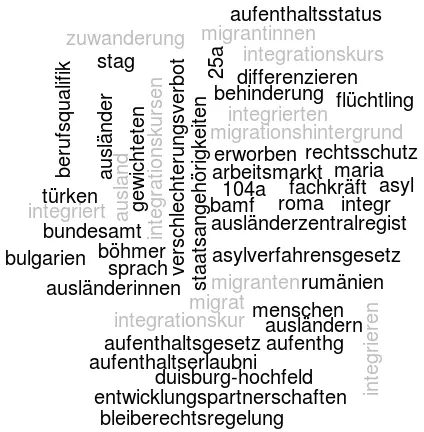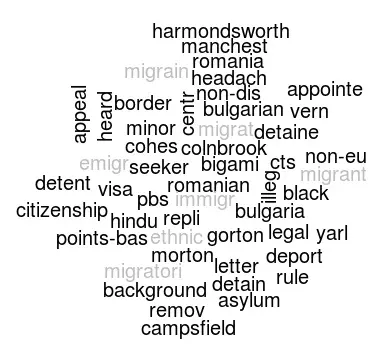Group-Specific Variations and Adaptations of Legislative Behaviour
How do Members of the German Bundestag and the British House of Commons speak about immigration and integration? |
|---|


Figure: Analysis of co-occurrences (“keyness”) of terms relating to immigration and integration in the German Bundestag (2009-2013) and the British House of Commons (2010-2015)
The project "Pathways to Power: Representation of Citizens of Immigrant Origin in Eight European Democracies" (PATHWAYS) is funded by the German Research Foundation (DFG) as part of an ORA+ project (2014-2017). Within this project, the Bamberg team extracts parliamentary questions for written answers, prepares them for analysis, produces online tools for validation and basic analyses, links them with socio-demographic and political data collected by the PATHWAYS consortium, and presents initial quantitative analyses. The Bamberg team also supports other country teams in filtering the text corpus, linking it with other relevant information and conducting basic quantitative analyses. At present, the relevant database includes approximately 500,000 documents (parliamentary questions) from eight European legislatures (Belgium, France, Germany, Greece, Italy, the Netherlands, Spain, and the United Kingdom). We use methods of quantitative text analysis to describe the legislative behaviour of legislators with an immigrant background and seek to explain variations within these groups as well as variations across legislatures, political party families, age groups, and cohorts ("political generations"). In theoretical terms, our focus is on questions of "substantive" democratic representation: To what extent are group-specific differences in issue attention articulated in the legislature? To what extent (and how quickly) do legislators respond to changes in public opinion? Do they follow public opinion, or do they shape it? How do institutions such as electoral systems affect these processes? How do political parties (as organisational contexts) and party competition shape how and the extent to which group-specific interests (e.g., of women or immigrants) are articulated in parliament? What social mechanisms are at work in this context? Should the behaviour of legislators be modelled as a process of socialization and adaptation to the norms of their legislative parties legislatures, or as selection for particular attributes and policy priorities prior to their election? Can these unobserved processes be inferred from the language they use in the legislature?
Partner
- Prof. Dr. Manlio Cinalli, Sciences Po Paris
- Prof. Dr. Laura Morales, University of Leicester
- Prof. Dr. Jean-Benoît Pilet, Université Libre de Bruxelles
- Prof. Dr. Jean Tillie, University of Amsterdam
Funding
ANR, DFG, ESRC, NWO (ORA+)
Literature
- Laura Morales and Thomas Saalfeld (eds.): Pathways to Power: The Political Representation of Citizens of Immigrant Origin in Europe. Oxford: Oxford University Press (in preparation, likely publication date 2017)
- Laura Morales, Thomas Saalfeld and Maria Sobolewska (eds.): Understanding the Patterns of Political Representation of Citizens of Immigrant Origin in Europe. Oxford: Oxford University Press (in preparation, likely publication date 2018)
